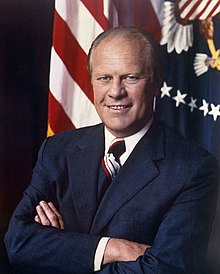
| ||
|---|---|---|
|
Pre-vice presidency
40th Vice President of the United States
38th President of the United States
Policies
Appointments
Tenure
Presidential campaign Post-presidency
 |
||
The United States foreign policy during the 1974–1977 presidency of Gerald Ford was marked by efforts to de-escalate the Cold War. Ford focused on maintaining stability and promoting détente with the Soviet Union. One of Ford's key foreign policy achievements was the signing of the Helsinki Accords in 1975. The accords were a series of agreements between the US, Soviet Union, and other European countries that aimed to promote human rights, economic cooperation, and peaceful relations between East and West. Ford met with Soviet leader Leonid Brezhnev several times, and the two countries signed the Strategic Arms Limitation Talks (SALT II) in 1979, which aimed to limit the number of nuclear weapons held by the two superpowers.
However, Ford's foreign policy was also marked by setbacks. The fall of South Vietnam in 1975 was a blow to US credibility and influence in the world. He presided over the final stages of the Vietnam War, announcing in April 1975 that U.S. participation in the war had ended. In the aftermath of the war, his administration responded forcefully to both the Mayaguez incident and an incident with North Korea in Panmunjom.
The US also faced challenges in the Middle East, with the 1973 oil crisis and the ongoing Arab-Israeli conflict. In the aftermath of the Yom Kippur War, the Ford administration facilitated completion of the Sinai Interim Agreement between Israel and Egypt.
© MMXXIII Rich X Search. We shall prevail. All rights reserved. Rich X Search

